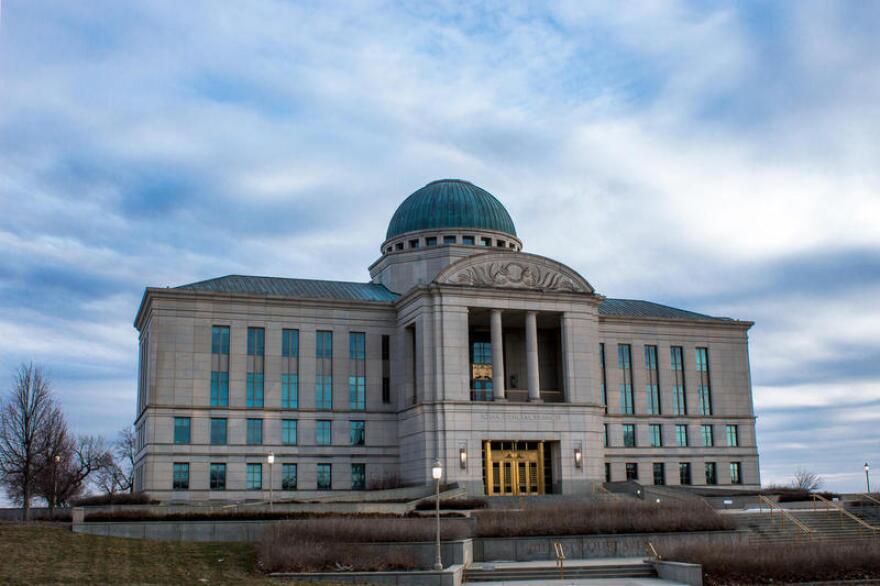A lawyer for Gov. Kim Reynolds asked the Iowa Supreme Court Tuesday to reinstate Iowa’s “fetal heartbeat” law and allow the state to enforce it.
Abortion is currently legal in Iowa up to 20 weeks of pregnancy.
If the Court allows the law to take effect, it would ban abortions after cardiac activity is detected. That can be as early as six weeks of pregnancy, or about two weeks after a missed period. The law has exceptions for rape, incest, preserving the life of the pregnant person, and fetal abnormalities that are incompatible with life.
Reynolds signed the bill into law in 2018, but it was blocked by the Polk County District Court and never enforced. At the time, legal protections for abortion rights did not allow for such a strict abortion ban.
That changed last June, when the Iowa Supreme Court ruled there is no fundamental right to abortion subject to strict scrutiny, and the U.S. Supreme Court overturned Roe v. Wade. After that, Reynolds asked the courts to reconsider the “fetal heartbeat” ban.
“What the legislature did in 2018 in enacting the fetal heartbeat law, it’s perfectly consistent with both constitutions,” said Alliance Defending Freedom attorney Chris Schandevel, who was representing the state Tuesday. “Because there is no fundamental right to abortion.”
Schandevel argued the Court has no choice but to allow the state to enforce the law because of last year’s court decisions.
Planned Parenthood and the ACLU of Iowa argued there is no legal basis for reviving a law that was unconstitutional when it passed and was then permanently blocked by a court four years ago. Their attorneys argued Reynolds had 30 days to appeal the injunction that was issued in 2019, but she declined to do so.
“This abortion ban was dangerous, cruel and unconstitutional at the time that it was passed,” said ACLU of Iowa Legal Director Rita Bettis Austen. “And it remains dangerous, cruel and unconstitutional today.”
Planned Parenthood attorney Peter Im said the Iowa Supreme Court’s decision last year left in place the “undue burden” standard for abortion rights, which would mean the abortion ban is still unconstitutional.
Schandevel disagreed and said the “rational basis” test now applies, which would open the door to banning abortion in Iowa.
“The legislature clearly has a legitimate and…compelling interest in protecting and preserving fetal life,” he said.
Ruth Richardson, president and CEO of Planned Parenthood North Central States, said the law would have a devastating impact on Iowans.
“If this 2018 law is resurrected, it would block about 98% of abortions in Iowa, forcing people to travel out of state, to self-manage their abortions outside of the medical system, or be forced into forced pregnancy and birth,” she said.
Richardson said maternal mortality rates will continue to get worse, especially for people of color, as more states ban abortion. She said Planned Parenthood is preparing to implement the abortion ban in case it becomes enforceable in Iowa.
The Court is expected to issue an opinion by the end of June.
Reynolds, a Republican, appointed five of the seven justices on the Iowa Supreme Court.
“I remain optimistic that the Iowa Supreme Court will allow the fetal heartbeat bill to take effect as the Iowa Constitution requires,” Reynolds said in a statement Tuesday. “Since the U.S. Supreme Court overturned Roe v. Wade, decision-making power has been returned to the states. Our citizens and their elected officials have chosen to promote life and end abortion at a heartbeat, with exceptions for rape, incest, and life of the mother.”
Medical experts have criticized the term “fetal heartbeat” in the context of abortion bans, because a pregnancy is not medically considered a fetus until about 10 weeks after the person’s last period. Cardiac activity can be detected as early as 6 weeks from the last period, when the pregnancy is still in the embryonic stage and the heart is not fully developed.
Sen. Sarah Trone Garriott, D-West Des Moines, said Democrats trust Iowans to make their own choices about their own bodies and futures.
“Despite years of legal precedent and wide public support across political affiliations for reproductive freedom in Iowa, an extreme faction of anti-choice Republicans won’t stop until they have a total ban on abortion,” she said.





